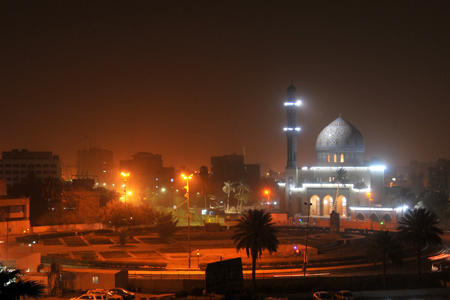Injured In Iraq
Civilian contract personnel working in Iraq for a U. S. employer have often been injured while on the job overseas. At one point, the casualties of contractors exceeded those of the U.S. military. There are still many thousands of contractor employees in Iraq.
Contract personnel have taken on many of the roles previously undertaken by the military. Contracts have been awarded to provide Base Operational Services (BOS) such as food service, janitorial, maintenance and many more. Jobs that used to be done by the military have now been outsourced, leaving the soldiers to focus more on the military operation at hand, and less on the support services.
Know The Facts
In many instances, private companies have served in para-military roles, providing mission support, personal security, and training the Iraqi forces. Many of these contractors are former military, and rely on their training to perform their duties. In many cases the contractors were working right alongside the military, so the type and extent of injuries were often exactly the same as the military incurred. The contractors are not just from the private security firms – there are those working for the aircraft and munitions companies that are there doing training and maintenance on the equipment. There are telecommunications and Information Technology specialists there doing a variety of jobs.
Companies which are awarded contracts by the Department of Defense or by the foreign government with U.S. support and funding must carry a particular type of workers’ compensation insurance. This is known as Defense Base Act, or DBA, insurance. It serves to compensate workers injured overseas while working for these U.S. contractors, providing a percentage of wage replacement and paying for medical treatment. There is a long list of companies who have had and still do have contractors working in Iraq. With the growing threat of ISIL there may be the need for additional private security contractors, as the U.S. is hesitant to put military boots back into the country.
Burn Pits, One major issue is that of diseases allegedly caused by the toxic smoke and fumes from the burn pits. Waste of all types was disposed of by burning, and this created major air quality issues. There is extensive ongoing litigation regarding the use of these pits, and the injuries caused by the smoke. You may have a DBA claim if you were in any of the following areas, were subjected to the smoke from the pits, and now you are suffering from a chronic disease.


The current known burn pit locations in Iraq are:
Abu Ghraib Prison
Al Asad Air Base
Al Quo
Al Taqaddum (Ridgeway)
Ali Air Base (formerly Talil Air Base)
Al-Sahra aka Camp Speicher
Baghdad International Airport (BIAP)
Balad Air Base
Baqubah (FOB) (Warhorse)
Camp Adder, Talil Air Base
Camp Al Taji (Army Airfield)
Camp Anderson
Camp Ar Ramadi
Camp Bucca
Camp Cedar I and I, Talil Air Base
Camp Chesty
Camp Courage, Mosul
Camp Cropper
Camp (FOB) Delta, Al Kut
Camp Echo, Diwaynia
Camp Geiger
Camp Liberty (aka Camp Trashcan)
Camp Loyalty
Camp or LSA Anaconda
Camp Ridgeway (Al Taquaddum)
Camp Rustamiyah
Camp Scania
Camp Shield, Baghdad
Camp Speicher aka Al Sahra Airfield (formerly FOB)
Camp Stryker
Camp Victory
COB Meade, Camp Liberty
Diwaynia
Fallujah
FOB Caldwell, Kirkuk
FOB Endurance, Qayyarah Airfield West/Saddam Air Base
FOB Freedom, Kirkuk
FOB Gabe, Baqubah
FOB Marez, Mosul
FOB Summerall (Bayji and Taji)
FOB Sykes (Tall’ Afar)
FOB Warrior, Kirkuk
Green Zone or International Zone
Kalsu
Kirkuk
Kut Al Hayy Airbase
Mosul
Navstar
Q-West, Qayyarah Airfield West/Saddam Air Base
Scania
Taji
Talil Air Base (now is Ali Air Base)
Tall’ Afar
There are a myriad of conditions that appear to be caused by the burn pits, everything from asthma and breathing problems to digestive issues to cancers of various kinds. Some have skin issues, with open wounds, still weeping. Some conditions are difficult to diagnose, but are suspected to be the result of inhaling the toxic fumes. DBA claims that involve burn pit conditions take a special expertise, and experienced DBA attorneys.
Traumatic Brain Injury (TBI)
It has been said that Traumatic Brain Injury is the signature wound of the Iraq war. These injuries result from blows to the head, and are also known as concussion injuries. The concussive blasts from grenades, bombs, suicide bombers and IEDs have contributed to record numbers of TBI injuries. Advances in body armor protect the main part of a person’s body much better; people survive blasts in much greater numbers than ever before. The head is still susceptible to trauma.
Many times TBI is difficult to diagnose, as it can manifest differently in different people. Tests such as MRIs and CAT scans can show normal, and yet there is a debilitating injury. Symptoms such as cognitive problems, memory loss, mood swings, attention deficits, headaches, dizziness, vision problems and difficulty thinking or processing can be present. A person with TBI can have some or all of the problems. Initial symptoms may appear to be mild, but can leave a person with debilitating outcomes. A person can be impacted physically, psychologically and cognitively. Dealing with these problems can lead to depression and further impair personal relationships. It is important to obtain immediate medical care, and to ensure that ongoing symptoms and issues are addressed. If the injured person is eligible for DBA benefits, it can be a long and difficult road to obtaining those benefits.
PTSD/PTSI – Another possible condition which arises from working in a war zone is Post Traumatic Stress Disorder (PTSD), or as it is more recently termed, Post Traumatic Stress Injury (PTSI). This is a very real psychological condition which results from a terrifying event or long exposure to traumatic events, such as seeing the horrors of war over a period of time. Symptoms may include flashbacks, mood
swings, nightmares, severe anxiety and obsessing about a particular event. Sufferers often have difficulty sleeping, feel helpless or hopeless, have trouble re-establishing personal relationships. It can be debilitating. PTSD/ PTSI also may not manifest immediately after witnessing the events, but simmer deep within the person’s psyche until some later triggering event.
Many contractors working in Iraq have suffered this condition, and it is a recognized condition for DBA compensation purposes. The key is good diagnosis and treatment, and a dedicated attorney experienced in pursing these types of claims. They will know the criteria you must prove for a PTSD/PTSI claim, and will help you assemble that proof.
There are many types of injuries that contractors have suffered during the military operation in Iraq. It can be difficult to navigate the maze of rules and regulations to pursue a DBA claim. If you have been injured in Iraq, or developed a condition that you think may be a result of your working in Iraq, you should consult an experienced DBA attorney. The attorneys at Barnett, Lerner, Karsen and Frankel, P.A. are experienced, dedicated DBA lawyers and they will help you obtain the compensation you deserve.
